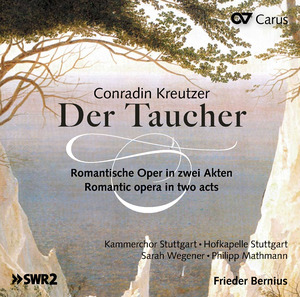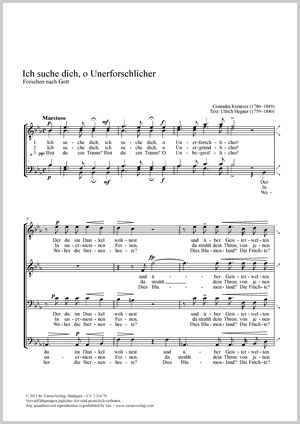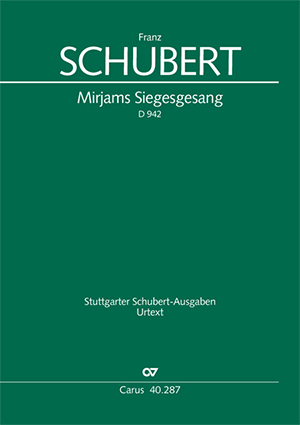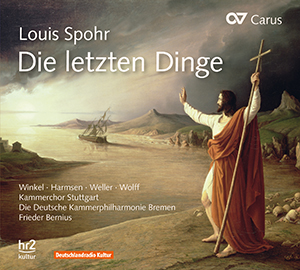Der Taucher (The diver)
Romantic opera in 2 acts. Concert performance Op. 50, 1813
One of Frieder Bernius’s great passions is to track down forgotten works lurking in archives and present them to the public. Conradin Kreutzer’s two-act opera Der Taucher (The Diver) (freely adapted from Schiller) is just such a lost gem. This captivating and lyrical work with memorable melodies and colorful, early-Romantic orchestration, was originally written for a performance at the Stuttgart Court Theater in 1813. Today it is best known in a second version that Kreutzer created for later performances in Vienna. Now a recording of the early, original version is available for the first time.
The Kammerchor Stuttgart and the Hofkapelle Stuttgart, joined by sopranos Sarah Wegener and Philipp Mathmann, present this operatic rarity under the baton of Frieder Bernius. After some 200 years, you can now enjoy the music of a composer well worth (re)discovering!
Contents
-
Composer
Conradin Kreutzer
| 1780-1849auch Konradin Kreutzer; *1780 in der Thalmühle bei Meßkirch (Baden), †1849 in Riga. 1799 juristisches Studium in Freiburg, lebte danach in Konstanz und in der Schweiz als Sänger und Pianist, 1804 Kompositionsunterricht bei Albrechtsberger in Wien. Seine Oper Konradin von Schwaben wurde 1812 mit solchem Erfolg aufgeführt, dass ihm König Friedrich von Württemberg die Stelle des Hofkapellmeisters anbot. Danach weitere Stationen als Kapellmeister in Donaueschingen, Wien und Köln, später Übersiedlung nach Riga. Er schuf 30 Opern (am bekanntesten Das Nachtlager von Granada), einige sehr klangvolle Männerchöre auf Texte von L. Uhland, eine Pastoralmesse und Klavierkonzerte. Personal details
-
Songwriter / Librettist
Samuel Gottlieb Bürde
| 1753-1831
-
Ensemble
Kammerchor Stuttgart
The Kammerchor Stuttgart is regarded as one of the best ensembles of its kind. Over its fifty-year existence, Frieder Bernius has developed the choir into an exceptional ensemble acclaimed by audiences and press alike. This has led to invitations for the choir to perform at all the important European festivals. In Germany the chamber choir performs at festivals and in concert halls in repertoire ranging from the 17th to the 21st century. Frieder Bernius and his ensemble have received numerous accolades for their contribution to new music. The Kammerchor Stuttgart has made over 80 CDs and LPs, numerous of which have been awarded international recording prizes (including the Edison award, Diapason d’or, Gramophone Choice, Classical Internet Award, International Classical Music Award, and German Record Critics’ Award prizes). The International Federation for Choral Music has invited the ensemble to sing at the 1st, 4th and 10th World Symposia on Choral Music in Vienna, Sydney and Seoul. Regular tours of North America and Asia since 1988 and a South America tour reflect the Kammerchor Stuttgart’s international reputation. Since 1984 the top ensemble has also been invited to Israel biennially. Personal details
-
Instrumental ensemble
Hofkapelle Stuttgart
The Hofkapelle Stuttgart, founded in 2006 by Frieder Bernius to complement the Barockorchester Stuttgart, concentrates on repertoire from the 19th century performed on authentic instruments. One of its main focusses is the rediscovery of music-historical treasures, particularly works from the south-west German region (by composers such as Kalliwoda, Knecht and Holzbauer). The Hofkapelle and Barockorchester Stuttgart regularly perform at international festivals (Rome, Salzburg, Göttingen, Dresden, etc.). CDs made by both groups have received many awards: the Missa Dei Patris by Jan Dismas Zelenka was nominated for the Cannes Classical Award, and the Incidental Music to Shakespeare’s Ein Sommernachtstraum [A Midsummer Night’s Dream] by Felix Mendelssohn Bartholdy was featured by Rondo magazine and awarded the Star of the Month prize by Fono Forum magazine. Mozart’s Requiem received the Diapason d’or de l’année 2003, Johann Gottlieb Naumann’s opera Aci e Galatea was named opera recording of the year in Opernwelt magazine and Bach’s Easter Oratorio included in the Quarterly Critics’ Choice of the German Record Critics’ Award. The group’s recording of Bach’s B Minor Mass was Editor’s Choice in Gramophone magazine. Personal details
-
Conductor
Frieder Bernius
| 1947Frieder Bernius’s work has earned great worldwide recognition. He is in demand internationally as a conductor and as a teacher. His principal artistic collaborators are the ensembles he founded himself, the Kammerchor Stuttgart, the Barockorchester Stuttgart, the Hofkapelle Stuttgart and the Klassische Philharmonie Stuttgart. As a guest conductor, he has collaborated repeatedly with, for example, the SWR Vokalensemble Stuttgart, the Deutsche Kammerphilharmonie Bremen, the Stuttgarter Kammerorchester and the Streicherakademie Bozen. Great stylistic versatility is Frieder Bernius’s hallmark. Whether he conducts vocal works by Monteverdi, Bach, Händel, Mozart, Beethoven, Fauré and Ligeti, stage music by Mendelssohn or symphonies by Haydn, Burgmüller and Schubert, his work always aims for a sound that is at once unmistakably personal and at the same time oriented towards the original period sound ideal. He devotes himself equally to the rediscovery of 18th century operas and to first performances of contemporary compositions. He is particularly interested in the musical history of southwestern Germany. Carus-Verlag has awarded Frieder Bernius a Golden CD for his complete recording of the sacred music of Felix Mendelssohn Bartholdy. The award was presented to him during the German Choir Festival in Stuttgart 2016. The sale of over 250,000 recordings, which has been acclaimed with a number of awards, has made a not insignificant contribution to what today is the obvious presence of Mendelssohn's complete œuvre in the concert repertoire. Personal details
-
Soloist - soprano
Philipp Mathmann
-
Soloist - soprano
Sarah Wegener
-
Soloist - tenor
Daniel A. Schmidt
-
Soloist - baritone
Pascal Zurek
-
Soloist - baritone
Johannes Hill
-
Narrator
Barbara Stoll
Frequent questions about this work
 There are no questions and answers available so far or you were unable to find an answer to your specific question about this work? Then click here and send your specific questions to our Customer Services!
There are no questions and answers available so far or you were unable to find an answer to your specific question about this work? Then click here and send your specific questions to our Customer Services!







